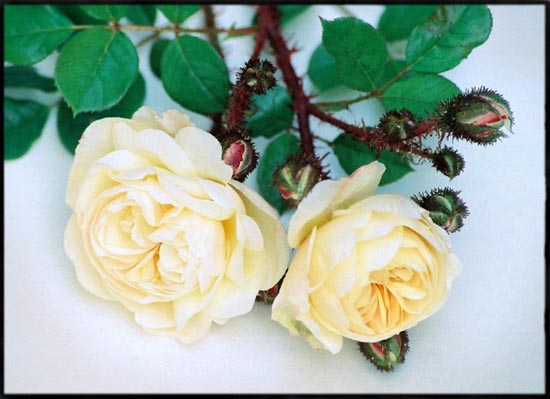 |
|
Albas |
Fakir's Delight, bred by Ralph Moore, California 1995. Commercial release in 2006.
This remarkable rose is one of the most original roses to come from the Ralph Moore breeding program. It is certainly one of the most remarkable roses this author has ever seen! Picture a climbing Moss Rose, with limber, trailing canes covered in dark mahogany thorns and dark, semi-glossy foliage. Blooms are produced in clusters of up to a dozen on the ends of new growth and on laterals of older canes. The buds are heavily mossed with brown moss, and they open to deeply cupped amber and cream colored blossoms. The bloom form is reminiscent of some of the Old Garden Roses and the David Austin hybrids; deep cups full of petals arranged informally and sometimes quartered. The color is soft buttery amber fading to cream, and there is a delicious fragrance. This climber has exceptional vigor, and appears to make a mature specimen of about 10 feet tall. Rebloom is very good on established plants, and it appears to be quite disease resistant as well. The breeding of this rose is a study in planning: "Lemon D" (a nickname for this breeding plant, not to be confused with its parent, 'Lemon Delight') is a cross of 'Little Darling' and 'Lemon Delight', one of the Miniature Mosses from the 1970's. "Lemon D" is used as a seed parent at Sequoia only, and often passes on mossing and yellow coloring, as well as compact growth to most of its progeny. As a breeder, "Lemon D" is considered to be a great improvement over 'Lemon Delight', which was not very good as a parent. 'Out of Yesteryear' came from a cross of the yellow miniature 'Sequoia Gold' crossed with 'Muriel', making it ½ Miniature (1-72-1 X 'Gold Badge'), ¼ R. bracteata, and ¼ Hybrid Tea! Mr. Moore believes that the future of modern shrubs and many other roses lies in the genetic heritage of the modern Miniatures, and this line of breeding shows how much truth lies in that belief. Ralph says; "In the future, many kinds of roses, I believe, will have some Miniatures in their background for several reasons. My Minis have been bred to be grown as own-root (cutting propagated) plants, resistant to diseases, and hardy." Hybridizers take note! "
Original photographs and site content © Paul Barden 1996-2006 |
|||||||||||||||||

